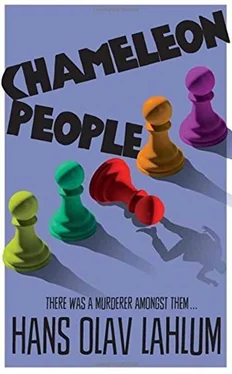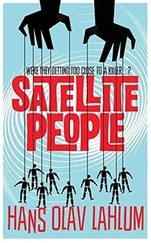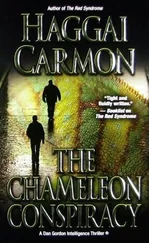I was completely unable to think clearly about what might be the most likely reasons for the kidnapping. I said to Patricia that I had to see her. She replied that I was welcome any time.
When I entered Patricia’s library, I realized that the table was empty. It was something I had never experienced before. Patricia had a packet of cigarettes in her hand, but there was not even a cup of coffee on the table. She said that if I would like anything to eat or drink, I just had to say, and I told her that I could not even face the thought at the moment.
I sat down and told her about the last few hours and Miriam’s disappearance.
Patricia seemed to be unusually unsettled by the situation. She lit a cigarette after only a few minutes and I saw that her hand was shaking. Even though the room was smoky and warm, she was still shivering. This made me even more anxious, but I was also touched by Patricia’s concern for Miriam.
‘There really are not many leads here,’ Patricia said, with a heavy sigh when I had finished.
I had to agree. Practically anyone could, in theory, have driven past and bundled Miriam into a car – especially if she was, as usual, reading as she walked. All that was needed was two people and a car. Another possibility was even more terrible: one person in a car could have stopped, shot her and then taken the body to conceal the crime.
‘Unfortunately, I think it is more likely that Miriam has been kidnapped in an attempt to render her harmless because she knows too much, rather than as possible leverage against you,’ Patricia then said, gently.
She carried on quickly before I had time to ask why she thought so.
‘Partly because kidnapping in order to exert pressure of some kind on a police officer would be tricky and entail a greater risk for the perpetrator. But it is also the matter of the book.’
It was beyond my understanding how she could deduce that from the book, and I was not in the mood to guess. So I asked what she meant. I added that the book was about languages and that Miriam had had it with her the day before as well.
‘Exactly. But according to what you said, she only had fifty pages left to read the day before. It would take me no more than half an hour to read them, and I would be surprised if your fiancée was any slower. So if she still had not finished the book, she must have spent a lot of time thinking or doing something else in the meantime. And I would dearly like to know what it was she did instead, as it could be crucial. Do we know anything about her day, before she disappeared?’
I said the same to Patricia that I had to Danielsen: we knew what Miriam had planned to do, but not necessarily what she had actually done. Miriam was going to go to a lecture from a quarter past ten to twelve, as she normally did on a Thursday. She would then go to the library until about three o’clock, before spending a couple of hours at the party office. Danielsen had no doubt started to map out what she had actually done.
‘Excellent. Let me know as soon as you have any more information. Otherwise, I wonder what was in the envelope she was carrying. That could also be crucial. There was no sign of that?’
I shook my head. Patricia sighed again.
‘Well, it is certainly clear that we cannot expect help from any quarter in this case. Let me know as soon as there is any news on what your fiancée did today or about the envelope. In the meantime, please tell me what you did earlier on this afternoon, as the investigation and kidnapping may well be related.’
It felt good to talk about something else, so I told her without further delay.
Patricia smoked in silence, but nodded with a little smile when I told her about my meeting with Solveig Ramdal. She did not look happy, however, and waved me impatiently on when I told her about my disastrous meeting with the lawyer Rønning and Lene Johansen. Then she listened attentively when I told her about the meetings at the prime minister’s office and the Soviet Embassy.
‘It could be a coincidence, but has it struck you that one of the key parties in the Fredriksen case lives near Sogn halls of residence?’ I asked.
Patricia had clearly thought about this too. She nodded quickly, but opened her hands at the same time.
‘Johan Fredriksen lives at Sognsvann, yes. It must be a coincidence. Even though he is about to become a very rich man, following the deaths of his father and sister, it is hard to imagine that he would have a motive for kidnapping your fiancée, and that he would have the resources to do so. Kidnapping for the purposes of extortion would be both complicated and risky for him and anyone else in the family or group of friends from 1932. Most likely they would all need help in order to do it, and they would be in great danger of being caught sooner or later. I think rather that Miriam has been kidnapped because she knew too much, about something significant that has happened or is about to happen. In which case, one might start to think in a different direction…’
‘To the East, you mean?’ I said.
Patricia nodded gravely and stubbed out her cigarette. ‘The Soviets have the resources and a possible motive linked to the oil agreement. And even more worryingly, they currently also have a man in Oslo who has killed before. But if it was them, it will not be easy to prove. The big question is how Miriam might have discovered something important in that connection? Did she know about that side of the case?’
My throat tightened, but I managed first to nod, and then to regain my voice. It all fitted uncomfortably well. Miriam had heard about the case from me the evening before – and had been visibly shaken.
Patricia looked as though she wanted to say something. But instead she finished another cigarette, stubbed it out and said: ‘I think that is where the answer lies, but we do not have enough information yet to make the connection. Think about it, and get in touch as soon as there is anything new. I will be up first thing and waiting. And in the meantime, know that I am thinking about you. This must be an extremely difficult situation for you.’
I was once again touched by Patricia’s concern – and told her so. We hugged each other affectionately and then I left.
It was quite a shock to be outside. The rain was heavier and felt cold on my face and head. I thought about how hard it would be to find clues at the spot where Miriam had been taken, if there were any. I suddenly realized how hungry I was.
I could not face going home, and even less making food. So I stopped at a cafe in Frogner that was still open and had a steak alone at a table in one of the darker corners of the cafe. It helped to ease my hunger, but not the feelings of fear and restlessness in the rest of my body.
At ten o’clock I finally went home. There was a brief glimmer of hope when I saw that the light was on in my flat. I ran up the stairs with a thumping heart. But my hope was soon snuffed out. The flat was quiet and empty and there was no sign that Miriam had been there. I had obviously just forgotten to turn off the light when I ran out.
The telephone rang as I sat there, and I answered in the wild hope that I would hear Miriam’s voice. But it was her mother’s broader Hedemark dialect that I heard at the other end. She asked how I was – and if there was any news of Miriam. I was deeply touched by the fact that she had thought of me in the middle of all this, and said so. But sadly I could not tell her anything about Miriam other than that an investigation had started and we hoped for good news, but everything was very uncertain.
She wondered if they should perhaps come to Oslo. I told her that there was not much they could do here at present, and it was perhaps best to stay where they were – in case Miriam or anyone else contacted her family home. She replied that that was a good idea and that they would hold the fort at home, but added that they were ready to come to the capital straightaway if they could be of any help.
Читать дальше












